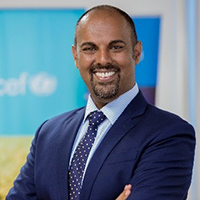Vijaya Ratnam
Everyone has a different role to play in the achievement of human rights
In Conversation with Vijaya Ratnam-Raman (LLM 2007)
Vijaya Ratnam-Raman, Melbourne Law School Alumnus and former Global Justice Specialist at UNICEF, joins the zoom with a friendly hello and a smile on his face. Currently taking a career break after 20 years of working on furthering the rights of children and young people globally, Vijaya has allowed time for reflection on his career to date and consideration of where his energies will be channelled next.
Vijaya is a passionate advocate for the rights of children and young people and has worked in Australia, Papua New Guinea, South Sudan, Thailand, Vietnam, and in the United States at United Nations Headquarters. Since he was a child, Vijaya dreamed of holding a “blue passport” to work at the United Nations. Fuelled by his own experiences of racism, homophobia, and the family law system in Australia, Vijaya reflects on his deep belief in the power of “justice in an unjust world”.
Vijaya laughs as he reflects on his conception of the law as a young lawyer: “when I was young and naive, I thought that if you change the law so that it said something wasn’t right, then it simply wouldn’t happen”. While acknowledging that the justice system is a “human system” that may fall short at times, Vijaya maintains that he still carries a very strong belief in the ability of the law to shape social norms and standards, which is where he sees the great power of the law.
“In the best of circumstances, the law can be a just and neutral, non- discriminatory kind of system that can uphold standards, that we as humans can turn to the law and be equal before the law”.
While Vijaya recognises this is a highly idealised version of the function of law, he maintains that global human rights shortcomings shouldn’t stop us from reaching for that ideal as citizens and legal practitioners.
When reflecting on his experience with UNICEF supporting Vietnam to establish its first ever specialised children's court, Vijaya shares that he has come to appreciate that his work is part of a long game that he may not be around to see the fruits of and emphasises the importance of that understanding in justice and rule of law work. Naturally, he admits, such an endeavour can be tiring and, at times, challenging to identify as impactful and meaningful. Vijaya explains that in doing such work, it is incredibly important to invest in personal wellbeing and outlets that allow decompression: “the most important thing is to know thy self and prioritise your wellbeing”.
Vijaya smiles as he discusses what he is most hopeful about for the future of human rights. “Beneficiary led movements are the future”, he says with conviction. He shares that he is “inspired by [ongoing] work around anti-racism, intersectionality, queer and gender identity, and climate justice” as they profoundly “call into question the foundations of our society [by] pushing for fundamental shifts in how we are organised”. Vijaya’s excitement becomes clear as he explains that a more diverse range of voices are being heard now than ever before, noting that “people are talking about these issues like never before”.
Vijaya really drives the point home that human rights work, in an ideal form, should aim to:
“reflect the reality of people’s lives and have people be active in their own lives”
noting particularly the importance of local groups “leading the change that they want in their own lives”.
Vijaya is approachable and clearly impassioned by his belief in the importance of human rights. He indicated that he fundamentally believes “human rights are our life, our blood, what we breathe”, finishing with the idea that we all have an important role to play in our own communities in restructuring our systems and respecting each other’s voices.
Prepared by: Molly McDonald
JD Student MLS
November 2022
